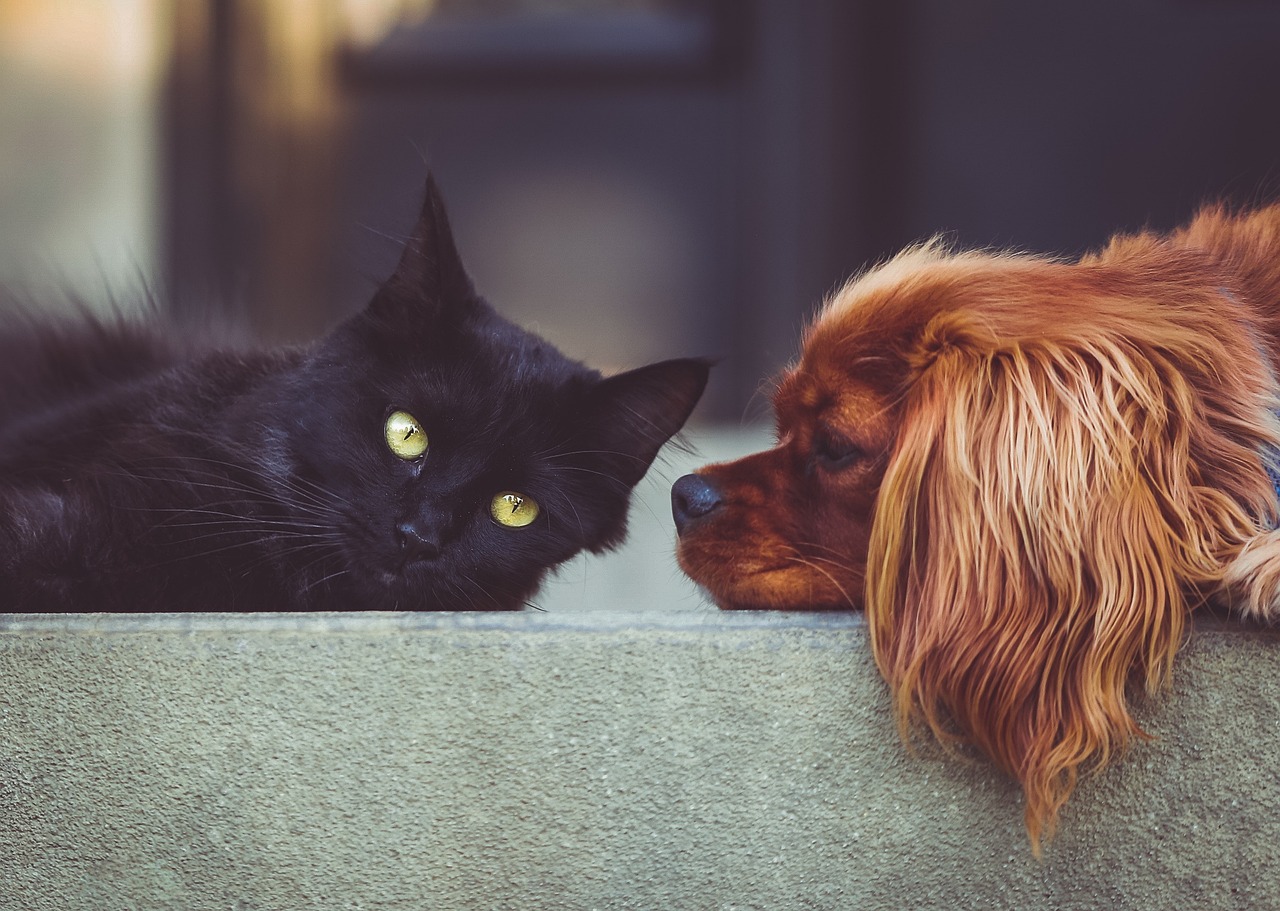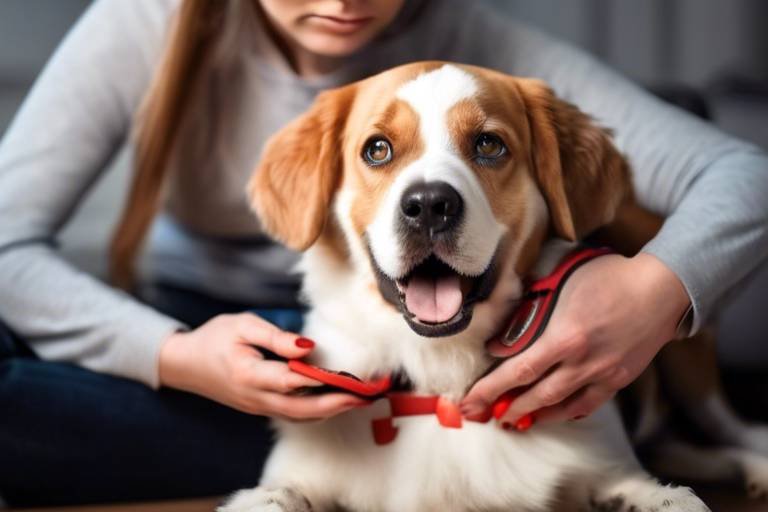The Importance of Regular Health Checks for Senior Pets
Regular health checks are not just a good idea; they are a necessity for our senior pets. Just like humans, as pets age, their bodies undergo numerous changes, making them more susceptible to various health issues. Imagine your beloved furry friend as a wise old sage, who has seen it all but now needs a little extra care to continue enjoying life. These check-ups are crucial for identifying potential health problems before they escalate, ensuring your pet remains happy and healthy.
Think of regular veterinary visits as a safety net. They provide an opportunity for veterinarians to catch any emerging issues early on, which can save you and your pet from unnecessary pain and suffering. The earlier a problem is detected, the easier it is to manage or treat. This proactive approach can make a world of difference in your pet's quality of life.
During these health checks, veterinarians can perform a range of assessments, from physical examinations to blood tests and vaccinations. Each visit is a chance to tailor your pet's care plan to their specific needs, considering factors like age, breed, and existing health conditions. For instance, if your dog is showing signs of slowing down or your cat has become less playful, these could be indicators of underlying health issues that a vet can help address.
Moreover, regular check-ups foster a strong bond between you, your pet, and your veterinarian. This relationship is vital for your pet's health journey. A veterinarian who knows your pet well can provide personalized advice and recommendations, ensuring that your furry friend receives the best possible care. In essence, these visits are not just about health; they are about building trust and ensuring peace of mind for both you and your pet.
To further emphasize the importance of regular health checks, consider the following benefits:
- Early Detection: Catching health issues early can lead to more effective treatments.
- Preventive Care: Regular visits allow for vaccinations and preventive treatments that can protect your pet from diseases.
- Behavioral Insights: Vets can help interpret behavioral changes that may indicate health problems.
- Nutrition Guidance: Tailored dietary advice can help maintain your pet's health as they age.
In conclusion, prioritizing regular health checks for your senior pets is one of the most loving decisions you can make as a pet owner. It’s not just about keeping them alive; it’s about enhancing their quality of life and ensuring they spend their golden years as comfortably and joyfully as possible. So, let’s commit to those vet visits and give our aging companions the care they truly deserve!
Q: How often should I take my senior pet to the vet?
A: Generally, senior pets should visit the vet at least twice a year. However, your veterinarian may recommend more frequent visits depending on your pet's health status.
Q: What should I expect during a senior pet health check?
A: During a health check, expect a thorough physical examination, discussions about your pet's behavior and diet, and possibly blood tests or other diagnostics to assess their overall health.
Q: Are there specific vaccinations my senior pet needs?
A: Yes, senior pets may require different vaccinations compared to younger pets. Discuss with your veterinarian which vaccinations are essential for your pet’s health.
Q: How can I tell if my senior pet is in pain?
A: Signs of pain can include changes in behavior, reluctance to move, vocalizations, and changes in appetite. If you notice these signs, consult your veterinarian promptly.

Understanding Senior Pet Health
As our furry friends age, their health needs undergo a significant transformation, much like how we humans experience changes as we grow older. Understanding these changes is crucial for pet owners who want to provide the best possible care for their aging companions. Just like a fine wine that requires specific conditions to mature beautifully, senior pets need tailored attention to thrive in their golden years.
One of the most important aspects of senior pet health is recognizing that they may not be as sprightly as they once were. With age comes a higher risk of various health issues, including but not limited to arthritis, dental diseases, and organ dysfunction. Just as we schedule regular check-ups for ourselves, our pets also benefit from routine veterinary visits. These check-ups are essential for early detection of potential health problems, allowing for timely interventions that can significantly improve their quality of life.
Moreover, senior pets often exhibit subtle changes in behavior that may indicate underlying health issues. For instance, a once-active dog might become less enthusiastic about walks or playtime. Owners should be vigilant and observant, as these changes can be the first signs of discomfort or illness. Keeping a close eye on your pet's habits and routines is akin to being a detective, piecing together clues that can lead to better health outcomes.
To further illustrate the importance of understanding senior pet health, consider the following common changes that occur:
- Decreased Energy Levels: Older pets often tire more quickly than their younger counterparts.
- Changes in Appetite: A shift in eating habits can signal health issues, whether it’s a decrease or increase in food consumption.
- Weight Fluctuations: Maintaining a healthy weight is critical; obesity or drastic weight loss can lead to serious health complications.
- Altered Grooming Habits: Senior pets may groom less frequently, leading to matted fur or skin issues.
Understanding these changes not only helps in recognizing potential health issues but also fosters a deeper bond between pet and owner. It transforms the relationship from mere companionship to a partnership where both parties are invested in maintaining a healthy lifestyle. Just like we might adjust our own diets, exercise routines, and healthcare needs as we age, our beloved pets deserve the same level of care and attention.
In conclusion, being proactive about understanding senior pet health is vital. By staying informed and observant, pet owners can ensure their aging companions enjoy a happy, healthy life well into their golden years. After all, a little knowledge can go a long way in making a positive difference in our pets' lives.

Common Health Issues in Senior Pets
As our beloved furry companions age, they often face a myriad of health challenges that can significantly affect their quality of life. Just like humans, senior pets experience changes in their bodies and behaviors that can lead to various health issues. It's essential for pet owners to be vigilant and proactive in recognizing these problems early on. By understanding the common health issues that senior pets encounter, you can take steps to ensure they receive the appropriate care and treatment.
One of the most prevalent issues is arthritis, a degenerative joint disease that can cause pain and discomfort in your pet. Imagine how it feels for your pet to struggle to get up after a long nap or to hesitate before climbing stairs. This condition can manifest in various ways, such as limping, stiffness, or even reluctance to engage in play. Recognizing these signs early can lead to effective management strategies, such as medications or physical therapy, which can significantly improve their mobility and overall happiness.
Another common issue is dental disease. Just like humans, pets can suffer from plaque buildup, gum disease, and tooth decay, which can lead to severe health complications if left untreated. Poor dental health can affect not just your pet's mouth but also their heart, liver, and kidneys. Regular dental check-ups and cleanings are crucial for preventing these issues. It's essential to keep an eye out for signs like bad breath, difficulty eating, or swollen gums, as these can indicate underlying dental problems.
In addition to arthritis and dental issues, senior pets often experience organ dysfunction. As pets age, their organs may not function as efficiently as they once did. Conditions such as kidney disease, liver problems, and heart disease are more common in older pets. Regular veterinary check-ups can help monitor organ function through blood tests and other diagnostics, allowing for early intervention if any issues are detected. Being proactive about your pet's health can make a world of difference.
To summarize, here are some of the most common health issues faced by senior pets:
- Arthritis - Affects mobility and causes discomfort.
- Dental Disease - Can lead to severe health complications.
- Organ Dysfunction - Common in older pets, affecting various bodily functions.
By being aware of these issues, you can take the necessary steps to ensure your senior pet remains healthy and happy. Regular check-ups, a balanced diet, and appropriate exercise are vital in managing these common health problems. Remember, your pet relies on you to provide the best care possible, especially as they enter their golden years.
Q: How often should I take my senior pet to the vet?
A: It's recommended to take senior pets to the vet at least twice a year for check-ups. This helps monitor their health and catch any potential issues early.
Q: What are the signs that my senior pet may be in pain?
A: Look for signs such as limping, reluctance to move, changes in behavior, or vocalizations. If you notice any of these, consult your veterinarian.
Q: Are there special diets for senior pets?
A: Yes, many pet food brands offer formulas specifically designed for senior pets that cater to their unique nutritional needs. Consult your vet for recommendations.
Q: Can I give my senior pet supplements?
A: Some supplements can be beneficial for senior pets, such as joint support or omega fatty acids. Always consult your veterinarian before introducing any new supplements to your pet's diet.
Arthritis and Mobility Problems
As our beloved pets age, one of the most common ailments they face is arthritis. This degenerative joint disease can lead to significant mobility issues, making it difficult for our furry friends to engage in activities they once enjoyed. Imagine how frustrating it must be for them when they want to chase a ball or jump onto the couch but their bodies just won’t cooperate. This is why understanding arthritis and its impact on mobility is crucial for pet owners.
Arthritis can manifest in various forms, primarily osteoarthritis, which is characterized by the wearing down of cartilage in the joints. As the cushioning diminishes, bones can rub against each other, causing pain and inflammation. This condition isn’t just about discomfort; it can lead to a decline in overall quality of life. Pets with arthritis may become less active, which can further exacerbate their condition by leading to weight gain and muscle atrophy. It’s akin to a vicious cycle where inactivity leads to more pain, which in turn leads to even less activity.
Recognizing the signs of arthritis in senior pets is essential for timely intervention. Common indicators include:
- Limping: A noticeable limp, especially after exercise, can be a clear sign of joint pain.
- Reluctance to Move: If your pet hesitates to climb stairs or jump onto their favorite spots, they may be experiencing discomfort.
- Changes in Behavior: Increased irritability or withdrawal from social interactions can indicate that your pet is in pain.
Once arthritis is diagnosed, there are several treatment options available to help manage the condition. Medications, such as non-steroidal anti-inflammatory drugs (NSAIDs), can provide relief from pain and inflammation. However, it’s crucial to consult with a veterinarian before administering any medication, as some can have side effects or interact negatively with other treatments your pet may be receiving.
In addition to medication, incorporating physical therapy can be incredibly beneficial. Techniques such as hydrotherapy or gentle exercises can help maintain mobility and strengthen the muscles surrounding the joints. A well-structured exercise plan can help keep your pet active while minimizing pain. Think of it as a tailored workout regimen designed specifically for their needs.
Dietary changes can also play a pivotal role in managing arthritis. Feeding your pet a balanced diet rich in omega-3 fatty acids can help reduce inflammation. Some owners even explore the use of joint supplements, like glucosamine and chondroitin, which have shown promise in supporting joint health. It's essential to discuss any dietary changes or supplement plans with your veterinarian to ensure they are appropriate for your pet's specific condition.
Ultimately, addressing arthritis in senior pets requires a comprehensive approach that combines medication, physical therapy, and nutritional adjustments. By recognizing the signs early and implementing effective management strategies, you can significantly improve your pet's quality of life and keep them comfortable as they age. Remember, a happy pet is a healthy pet!
Q: What are the common signs of arthritis in senior pets?
A: Common signs include limping, reluctance to move, changes in behavior, and difficulty getting up or lying down.
Q: Can arthritis be cured?
A: While there is no cure for arthritis, it can be effectively managed through medication, physical therapy, and dietary adjustments.
Q: How often should senior pets be checked for arthritis?
A: Regular veterinary check-ups at least twice a year are recommended for senior pets to monitor their joint health and overall well-being.
Q: Are there any specific diets that can help with arthritis?
A: Diets rich in omega-3 fatty acids, as well as those specifically formulated for joint health, can be beneficial for pets with arthritis.
Signs of Discomfort
Regular health checks are crucial for senior pets to ensure their well-being. This article explores the benefits, common health issues, and preventive measures to keep your aging companions healthy and happy.
As pets age, their health needs change significantly. Understanding these changes can help owners provide better care and recognize potential health issues early on.
Senior pets are prone to various health problems, including arthritis, dental disease, and organ dysfunction. Recognizing these issues early can lead to more effective treatment and management.
Arthritis is a common condition in older pets that affects their mobility. Understanding its symptoms and treatment options can improve their quality of life significantly.
Recognizing signs of discomfort in senior pets is crucial for ensuring their health and happiness. Just like us, our furry friends can experience pain and discomfort as they age, but they often can't express it in words. Instead, they may exhibit subtle changes in behavior that can be easy to overlook. Here are some key indicators to keep an eye on:
- Limping or Favoring a Limb: If you notice your pet limping or avoiding putting weight on a particular leg, it may be a sign of joint pain or injury.
- Reluctance to Move: An older pet that suddenly becomes less active or hesitant to jump, climb stairs, or engage in play may be experiencing discomfort.
- Changes in Grooming Habits: If your pet has stopped grooming themselves or has an unkempt coat, it could indicate they are in pain or feeling unwell.
- Behavioral Changes: Look for signs of irritability, withdrawal, or changes in sleeping patterns. A once-social pet may become a recluse if they are in pain.
These signs can be subtle, but they are critical for pet owners to notice. If you observe any of these behaviors, it’s essential to consult with your veterinarian. Early intervention can lead to better management of any underlying issues, ensuring your beloved pet remains as comfortable and happy as possible.
Various treatment options, including medications, physical therapy, and dietary changes, can help manage arthritis in senior pets, ensuring they remain active and comfortable.
Dental disease can severely impact the overall health of senior pets. Regular dental check-ups and cleanings are essential to prevent complications related to poor oral hygiene.
Proper nutrition plays a critical role in maintaining the health of senior pets. Tailoring their diet to meet their specific needs can promote longevity and vitality.
Selecting a diet formulated for senior pets can help address their unique nutritional requirements, supporting their overall health and energy levels.
Certain supplements can aid in managing age-related health issues in senior pets. Understanding which supplements are beneficial can enhance their quality of life.
Regular veterinary visits are essential for monitoring the health of senior pets. Preventive care can help catch potential issues early and ensure a longer, healthier life.
Keeping up with vaccinations and preventive treatments is vital for senior pets. Discussing these with your veterinarian can help protect them from common diseases.
Behavioral changes in senior pets can indicate underlying health issues. Observing these changes and discussing them with a veterinarian is crucial for effective care.
Q: How often should I take my senior pet to the vet?
A: It’s generally recommended to take senior pets for check-ups at least twice a year, as their health can change more rapidly than younger pets.
Q: What are the signs that my pet is in pain?
A: Signs of pain can include limping, reluctance to move, changes in appetite, and unusual vocalizations. Always consult your vet if you notice these signs.
Q: Are there specific diets for senior pets?
A: Yes, there are specially formulated diets for senior pets that cater to their unique nutritional needs, helping to support their health and energy levels.
Q: Can supplements help my aging pet?
A: Certain supplements can be beneficial for senior pets, particularly for joint health and overall vitality. Always consult your veterinarian before adding any supplements to your pet's diet.
Treatment Options
Treating arthritis in senior pets is not just about alleviating pain; it's about enhancing their overall quality of life. There are several effective treatment options available that can help your furry friends stay active and comfortable as they age. One of the most common approaches is the use of medications. Non-steroidal anti-inflammatory drugs (NSAIDs) are often prescribed to reduce inflammation and relieve pain. However, it’s essential to consult your veterinarian to find the right medication and dosage tailored to your pet’s specific needs.
In addition to medications, physical therapy has gained popularity as a non-invasive way to improve mobility in senior pets. Techniques such as hydrotherapy, massage, and targeted exercises can strengthen muscles and improve joint function. Just like humans, pets can benefit immensely from a personalized physical therapy regimen that focuses on their unique conditions and limitations.
Another critical aspect of managing arthritis is dietary changes. Switching to a diet rich in omega-3 fatty acids, antioxidants, and joint-supporting nutrients can help reduce inflammation and support joint health. Many pet food brands offer specialized formulas designed for senior pets, which can make a significant difference in their overall well-being. Always consult your veterinarian before making dietary changes to ensure that your pet receives the necessary nutrients without any adverse effects.
For some pets, supplements can also play a vital role in treatment. Glucosamine and chondroitin sulfate are popular choices that can help maintain joint health and improve mobility. These supplements work by providing the building blocks for cartilage repair and promoting joint lubrication. However, it’s essential to choose high-quality supplements and discuss them with your vet to ensure they are appropriate for your pet’s specific condition.
Finally, weight management is crucial in treating arthritis. Excess weight can put additional strain on your pet’s joints, exacerbating their discomfort. A combination of a well-balanced diet and regular exercise tailored to your pet’s capabilities can help them reach and maintain a healthy weight. This approach not only alleviates pressure on their joints but also contributes to their overall health and happiness.
In summary, managing arthritis in senior pets involves a multifaceted approach that includes medications, physical therapy, dietary changes, supplements, and weight management. By working closely with your veterinarian and tailoring these treatment options to your pet’s individual needs, you can help ensure that your beloved companion enjoys a comfortable and active life well into their golden years.
- How often should I take my senior pet to the vet? It's recommended to have senior pets checked at least twice a year to monitor their health closely.
- What signs indicate my pet might be suffering from arthritis? Look for signs such as limping, reluctance to jump or climb stairs, and changes in behavior, like increased irritability or withdrawal.
- Are there any specific diets that can help my senior pet with arthritis? Yes, diets rich in omega-3 fatty acids and antioxidants can help reduce inflammation and support joint health.
- Can supplements really make a difference for my senior pet? Absolutely! Supplements like glucosamine and chondroitin sulfate can promote joint health and improve mobility.
Dental Health Concerns
When it comes to our furry friends, dental health is often an overlooked aspect of their overall well-being, especially as they age. Just like humans, senior pets can suffer from a range of dental issues that can significantly impact their quality of life. Poor oral hygiene can lead to serious complications, including gum disease, tooth loss, and even infections that can affect other organs. It’s shocking to think that a simple dental problem can spiral into something much more serious, isn’t it?
One of the most common dental diseases in senior pets is periodontal disease, which occurs when plaque builds up on the teeth and hardens into tartar. This condition can cause inflammation of the gums, leading to pain and discomfort. If left untreated, it can progress to more severe infections that can enter the bloodstream, potentially affecting the heart, liver, and kidneys. This is why regular dental check-ups are not just a luxury, but a necessity for your aging companions.
So, how can pet owners ensure their senior pets maintain good dental health? Here are a few key points to keep in mind:
- Regular Veterinary Check-ups: Schedule dental check-ups at least once a year. Your veterinarian can perform professional cleanings and check for any signs of dental disease.
- At-Home Dental Care: Brush your pet’s teeth regularly using toothpaste specifically designed for pets. This simple habit can help remove plaque before it hardens into tartar.
- Dental Treats and Toys: Consider providing dental chews or toys that are designed to help reduce tartar and plaque buildup. These can be a fun way for your pet to maintain their dental hygiene.
In addition to these preventive measures, being aware of the signs that indicate dental issues is crucial. For instance, if your pet is showing reluctance to eat, has bad breath, or is pawing at their mouth, it might be time for a vet visit. Remember, early detection can make a world of difference in treatment outcomes.
Ultimately, by prioritizing your senior pet’s dental health, you’re not just ensuring they have a healthy mouth; you’re contributing to their overall vitality and happiness. Think of it as a way to give them the gift of a longer, more comfortable life. After all, our pets rely on us to keep them healthy and happy, and dental health is a vital part of that equation.
Q: How often should I have my senior pet's teeth checked?
A: It's recommended to have their teeth checked at least once a year. However, if you notice any issues, don't hesitate to schedule a visit sooner.
Q: Can I use human toothpaste for my pet?
A: No, human toothpaste can be harmful to pets. Always use toothpaste formulated specifically for animals.
Q: What are the signs that my pet might have dental problems?
A: Look for signs such as bad breath, difficulty eating, swollen gums, or excessive drooling. If you notice any of these, consult your veterinarian.
Q: Are dental treats effective?
A: Yes, dental treats can help reduce plaque and tartar buildup, but they should be used in conjunction with regular brushing and veterinary check-ups.

The Role of Nutrition in Senior Pet Care
As our furry companions age, their nutritional needs evolve, much like how our own dietary requirements shift as we grow older. Proper nutrition is not just about keeping your senior pet fed; it’s about providing them with a balanced diet that supports their unique health challenges and promotes longevity. Just like a well-tuned engine needs the right fuel to operate smoothly, your senior pet requires a tailored diet to thrive.
One of the primary concerns for aging pets is maintaining their weight. Obesity can lead to a myriad of health issues, including diabetes, heart disease, and joint problems. Therefore, it’s crucial to monitor their weight regularly and adjust their food intake accordingly. A diet rich in high-quality protein and low in unnecessary fillers can help maintain muscle mass while keeping their weight in check. Additionally, incorporating fiber can aid in digestion and prevent obesity by promoting a feeling of fullness.
When it comes to choosing the right diet for your senior pet, it's essential to look for formulations specifically designed for older animals. These diets often contain:
- Reduced calories to prevent weight gain
- Enhanced joint support with ingredients like glucosamine and chondroitin
- Antioxidants to combat age-related oxidative stress
- Omega fatty acids for a healthy coat and skin
Moreover, hydration is another critical aspect of senior pet nutrition. Older pets may not drink enough water, leading to dehydration, which can exacerbate kidney issues and other health problems. Ensuring your pet has access to fresh water at all times is vital. In some cases, incorporating wet food into their diet can help increase their overall fluid intake.
Supplements can also play a significant role in enhancing the quality of life for senior pets. Many owners find that adding supplements such as omega-3 fatty acids, probiotics, or joint support formulas can make a noticeable difference in their pet's energy levels and overall health. However, it's essential to consult with your veterinarian before introducing any new supplements to ensure they are appropriate for your pet's specific health needs.
In summary, the role of nutrition in senior pet care cannot be overstated. By providing a balanced, age-appropriate diet, monitoring their weight, ensuring proper hydration, and considering beneficial supplements, you can help your senior pet enjoy their golden years with vitality and joy. Remember, a well-nourished pet is a happy pet!
1. How often should I feed my senior pet?
It's generally recommended to feed senior pets two to three smaller meals a day instead of one large meal. This can help with digestion and weight management.
2. Are there specific ingredients I should avoid in my senior pet's food?
Yes, you should avoid foods high in fillers, artificial preservatives, and excessive carbohydrates. Ingredients like corn and soy can be harder for senior pets to digest.
3. How can I tell if my senior pet is overweight?
You can assess your pet’s weight by feeling their ribs. If you can’t feel their ribs easily, they may be overweight. Consult your vet for a proper evaluation.
4. Can I give my senior pet human food?
While some human foods are safe for pets, it's crucial to avoid harmful foods like chocolate, grapes, and onions. Always consult your vet before introducing new foods.
5. How often should I take my senior pet to the vet?
Senior pets should ideally have veterinary check-ups every 6 months, as their health can change rapidly compared to younger animals.
Choosing the Right Diet
When it comes to caring for our senior pets, nutrition is paramount. Just like humans, as pets age, their dietary needs evolve. Choosing the right diet for your aging companion can significantly impact their health, energy levels, and overall quality of life. Imagine this: a senior dog or cat is like a vintage car; it requires the right fuel and maintenance to keep running smoothly. So, what should you consider when selecting a diet for your furry friend?
First, it’s important to look for high-quality ingredients. Senior pets often need diets that are lower in calories but higher in essential nutrients. This helps prevent obesity, which can exacerbate existing health issues like arthritis or heart disease. Look for pet foods that list real meat as the first ingredient, as protein is crucial for maintaining muscle mass. Additionally, consider foods that are enriched with omega fatty acids, which can support joint health and improve skin and coat condition.
Another critical factor is the balance of fiber in your pet’s diet. As pets age, their digestive systems may slow down, leading to issues like constipation. A diet rich in fiber can aid digestion and promote a healthy gut. Look for foods that contain natural sources of fiber, such as beet pulp or pumpkin. However, it’s essential to introduce any dietary changes gradually to avoid upsetting your pet’s stomach.
Moreover, you might want to consider specialized senior diets that cater specifically to the needs of older pets. These diets often contain adjusted levels of protein, fat, and carbohydrates, tailored to support aging bodies. They may also include supplements like glucosamine and chondroitin, which are beneficial for joint health.
Some pet owners also explore the option of homemade diets. While this can be a great way to ensure your pet gets fresh, wholesome ingredients, it’s crucial to consult with a veterinarian or a pet nutritionist. They can help you formulate a balanced diet that meets all of your senior pet's nutritional requirements.
Finally, always keep an eye on your pet's weight and adjust their food intake accordingly. If your pet is gaining weight, it may be time to cut back on portions or switch to a lower-calorie formula. Conversely, if they seem to be losing weight, a more calorie-dense food may be necessary. Regular check-ups with your veterinarian can help you stay on track with your senior pet's dietary needs.
In summary, choosing the right diet for your senior pet is not just a matter of filling their bowl. It’s about understanding their unique needs and making informed decisions that promote their health and happiness. Remember, a well-fed pet is a happy pet!
- What should I look for in a senior pet food? Look for high-quality ingredients, appropriate levels of protein and fat, added fiber, and essential nutrients tailored for senior pets.
- Can I feed my senior pet homemade food? Yes, but it’s important to consult with a veterinarian to ensure the diet is balanced and meets all nutritional needs.
- How can I tell if my senior pet is overweight? You should be able to feel your pet's ribs without excess fat covering and see a noticeable waistline when viewed from above.
- Should I change my pet's diet if they have health issues? Yes, dietary adjustments may be necessary for managing specific health conditions. Always consult your veterinarian for guidance.
Supplements for Senior Pets
As our furry friends age, their bodies undergo various changes that can impact their overall health and vitality. This is where supplements come into play, acting as a powerful ally in managing age-related health issues. Just like humans, senior pets may benefit from additional nutrients that support their joints, skin, and overall well-being. It's essential to recognize that not all supplements are created equal, and choosing the right ones can make a significant difference in your pet's quality of life.
When considering supplements for senior pets, it’s crucial to focus on those that address specific health concerns. For instance, glucosamine and chondroitin are often recommended for pets suffering from arthritis or joint pain. These supplements help maintain cartilage health and may alleviate discomfort, allowing your pet to move more freely. Additionally, omega-3 fatty acids can support heart health and reduce inflammation, making them an excellent choice for aging pets.
Another important category of supplements includes antioxidants, such as vitamins E and C, which can help combat oxidative stress in senior pets. As pets age, their bodies may struggle to fight off free radicals, leading to cellular damage. By incorporating antioxidants into their diet, you can help bolster their immune system and promote a healthier, more active lifestyle.
It's also worth noting that some pets may require specific dietary adjustments, such as increased fiber for digestive health. In such cases, fiber supplements can aid in maintaining a healthy gut and preventing issues like constipation. Furthermore, probiotics can be beneficial in promoting a balanced gut microbiome, which is essential for overall health.
Before introducing any supplements into your senior pet's routine, it’s vital to consult with your veterinarian. They can provide personalized recommendations based on your pet's unique health profile, ensuring that you choose the most suitable options. Keep in mind that while supplements can offer significant benefits, they should not replace a balanced diet or regular veterinary care.
To help you navigate the world of pet supplements, here’s a quick reference table summarizing some popular options and their benefits:
| Supplement | Benefits |
|---|---|
| Glucosamine & Chondroitin | Supports joint health and mobility |
| Omega-3 Fatty Acids | Reduces inflammation and supports heart health |
| Antioxidants (Vitamins E & C) | Boosts immune system and fights oxidative stress |
| Fiber Supplements | Aids in digestion and prevents constipation |
| Probiotics | Promotes gut health and balances microbiome |
In conclusion, supplements can play a vital role in enhancing the health and well-being of senior pets. By carefully selecting the right products and consulting with your veterinarian, you can help your beloved companion enjoy their golden years with comfort and vitality.
- What are the most common supplements for senior pets?
The most common supplements include glucosamine, omega-3 fatty acids, antioxidants, fiber, and probiotics.
- How do I know if my pet needs supplements?
Consult your veterinarian to assess your pet's health and determine if supplements are necessary based on their specific needs.
- Can supplements replace my pet's diet?
No, supplements should complement a balanced diet but not replace it. A nutritious diet is essential for overall health.
- Are there any side effects of supplements?
While most supplements are safe, some may cause side effects in certain pets. Always monitor your pet and consult your vet if you notice any unusual behavior.

Preventive Care and Regular Check-Ups
When it comes to our beloved senior pets, preventive care and regular check-ups are nothing short of vital. Imagine your furry friend as a fine wine; the older they get, the more care they need to ensure they age gracefully and healthily. Regular veterinary visits are like the routine maintenance checks you perform on your car—they help catch potential issues before they become significant problems. During these visits, your veterinarian will conduct a thorough examination, checking for any signs of illness or discomfort that may not be immediately apparent to you. This proactive approach not only enhances the quality of life for your pet but also extends it.
In addition to the physical exams, these check-ups provide an excellent opportunity for pet owners to discuss any behavioral changes they’ve noticed. Has your once-active dog suddenly become a couch potato? Or has your cat started hiding more than usual? These changes can be subtle but may indicate underlying health issues that require attention. By keeping an open line of communication with your veterinarian, you can ensure that your pet receives the best possible care tailored to their unique needs.
Moreover, preventive care goes beyond just regular check-ups. It encompasses a range of practices aimed at keeping your pet healthy and happy. This includes:
- Vaccinations: Keeping up with essential vaccinations is crucial for protecting your senior pet from various diseases. Discuss with your vet which vaccines are necessary based on your pet's lifestyle and health status.
- Preventive Treatments: Regular treatments for parasites such as fleas, ticks, and worms are essential. Senior pets may be more susceptible to infestations, and preventive measures can help avoid complications.
- Dental Care: As mentioned earlier, dental health is critical. Regular dental cleanings can prevent serious health issues related to poor oral hygiene.
In addition to these preventive measures, it's essential to monitor your pet's weight and adjust their diet accordingly. Obesity can lead to a multitude of health problems, including diabetes and joint issues, especially in senior pets. Your veterinarian can provide guidance on maintaining a healthy weight through proper nutrition and exercise.
To summarize, regular veterinary visits and preventive care are key components in ensuring that your senior pet leads a long, healthy, and happy life. By being proactive, you not only safeguard their health but also strengthen the bond you share with them. Remember, your pet relies on you to be their voice and advocate when it comes to their health!
Q: How often should I take my senior pet to the vet?
A: Generally, senior pets should see a veterinarian at least twice a year for check-ups. However, if your pet has specific health concerns, more frequent visits may be necessary.
Q: What should I expect during a senior pet check-up?
A: A typical senior pet check-up includes a thorough physical examination, discussions about any behavioral changes, and assessments of weight, dental health, and vaccinations.
Q: Are there specific vaccinations that senior pets need?
A: Yes, senior pets may require different vaccinations based on their health status and lifestyle. It's essential to discuss this with your veterinarian.
Q: How can I help my senior pet maintain a healthy weight?
A: Regular exercise and a balanced diet tailored to your pet's age and health condition are crucial. Consult your veterinarian for personalized recommendations.
Vaccinations and Preventive Treatments
When it comes to our beloved senior pets, maintaining their health is a top priority, and one of the most effective ways to do this is through . Just like humans, pets can benefit immensely from staying up-to-date with their vaccinations, which serve as a shield against various diseases that could otherwise jeopardize their well-being. As pets age, their immune systems may weaken, making them more susceptible to infections. Therefore, ensuring that your furry friend is adequately vaccinated is not just a good idea—it's a necessity.
It's important to have an open dialogue with your veterinarian about which vaccines are essential for your senior pet. Common vaccinations for older pets may include:
- Rabies
- Distemper
- Parvovirus
- Bordetella (Kennel Cough)
Additionally, preventive treatments such as flea and tick control, heartworm prevention, and routine blood tests are crucial for early detection of potential health issues. These treatments not only protect your pet from parasites but also help in identifying any underlying health conditions before they escalate into serious problems. For instance, regular blood tests can reveal abnormalities in organ function, providing invaluable insights into your pet's health.
To give you a clearer picture, consider the following table that outlines the recommended vaccinations and preventive treatments for senior pets:
| Type | Frequency | Purpose |
|---|---|---|
| Rabies Vaccine | Every 1-3 years | Protects against rabies, a fatal disease |
| Distemper Vaccine | Every 3 years | Prevents a highly contagious viral disease |
| Heartworm Prevention | Monthly | Prevents heartworm disease, which can be fatal |
| Flea and Tick Control | Monthly | Prevents infestations and related diseases |
In conclusion, keeping up with vaccinations and preventive treatments is not merely a routine task; it is a vital part of your senior pet’s health care regimen. By being proactive, you can help ensure that your furry companion enjoys a long, healthy, and happy life. So, don’t hesitate to schedule that next vet visit—your pet will thank you for it!
Q: How often should my senior pet see the vet?
A: Generally, senior pets should have a veterinary check-up every six months. This allows for early detection of health issues.
Q: Are there specific vaccines that senior pets need?
A: Yes, senior pets should receive core vaccines like rabies and distemper, as well as any additional vaccines recommended by your veterinarian based on their lifestyle.
Q: What are the signs my senior pet may need to see a vet?
A: Signs include changes in appetite, lethargy, excessive drinking, weight loss, or any noticeable changes in behavior.
Q: Can I give my senior pet supplements?
A: Yes, many supplements can be beneficial, but it's best to consult your veterinarian for recommendations tailored to your pet's specific needs.
Monitoring Behavioral Changes
As our beloved pets age, they may start to exhibit a variety of behavioral changes that can be subtle yet significant. It's essential for pet owners to be vigilant and observant, as these changes can often be the first indicators of underlying health issues. Have you ever noticed your once playful pup becoming more withdrawn? Or perhaps your feline friend is suddenly less interested in her favorite sunspot? These shifts in behavior can be more than just a sign of aging; they can signal health problems that need attention.
One of the most common behavioral changes in senior pets is a decrease in activity levels. While it’s natural for older pets to slow down, a marked reluctance to engage in play or take walks can indicate discomfort or pain. Similarly, if your pet begins to hide more often or seems anxious, it could be a sign of cognitive decline or other health issues. Monitoring these changes closely is crucial, as they can guide you in seeking timely veterinary care.
To help you keep track of your pet’s behavior, consider maintaining a behavior journal. This can be as simple as jotting down notes about your pet's daily activities, eating habits, and any unusual behaviors you observe. Over time, this documentation can reveal patterns that may not be immediately obvious. For example, if your dog has started barking excessively at night, it might be worth discussing with your vet, as it could indicate anxiety or discomfort.
Here are some behavioral changes to monitor closely:
- Changes in Appetite: Eating less or refusing food can be a sign of dental issues or other health problems.
- Increased Aggression or Irritability: If your pet is suddenly more aggressive, it could be due to pain or discomfort.
- Changes in Sleeping Patterns: More frequent naps or trouble sleeping can indicate discomfort or anxiety.
- House Soiling: Accidents in the house can point to health issues or cognitive decline.
Don't hesitate to reach out to your veterinarian if you notice any of these changes. They can provide valuable insights and may suggest diagnostic tests to uncover any hidden issues. Remember, early detection is key to managing your senior pet's health effectively. Just like us, our furry companions can benefit from a proactive approach to their well-being.
Q: What should I do if I notice behavioral changes in my senior pet?
A: If you observe any significant behavioral changes, it's important to consult your veterinarian. They can help determine if there are underlying health issues that need to be addressed.
Q: How often should I monitor my pet's behavior?
A: Regular monitoring is recommended, especially as your pet ages. Keeping a journal can help you track any changes over time.
Q: Are there specific signs that indicate my pet may be in pain?
A: Yes, signs of pain can include reluctance to move, changes in appetite, vocalizations, and behavioral changes such as increased aggression or withdrawal.
Q: Can behavioral changes be a sign of cognitive dysfunction?
A: Absolutely. Cognitive dysfunction syndrome (CDS) can affect older pets, leading to confusion, disorientation, and changes in sleep patterns.
Frequently Asked Questions
- What are the signs that my senior pet needs a health check?
As pets age, they may exhibit various signs indicating the need for a health check. Look out for changes in behavior, such as increased lethargy, reluctance to move, or noticeable changes in appetite. Other signs include difficulty standing or walking, excessive grooming, or unusual vocalizations. If you notice any of these symptoms, it’s time to schedule a vet visit.
- How often should I take my senior pet for a check-up?
For senior pets, it’s generally recommended to have a check-up at least twice a year. This frequency allows your veterinarian to monitor any changes in health and catch potential issues early. Some pets may require more frequent visits based on their specific health conditions, so always consult your vet for personalized advice.
- What common health issues should I be aware of in senior pets?
Senior pets are prone to several health issues, including arthritis, dental disease, kidney disease, and heart problems. Being aware of these conditions can help you recognize symptoms early and seek appropriate care. Regular veterinary check-ups can also help catch these issues before they become serious.
- How can I improve my senior pet's mobility?
Improving your senior pet's mobility can be achieved through various methods. Regular, gentle exercise is crucial, as it helps maintain muscle strength and joint flexibility. Additionally, weight management is vital; keeping your pet at a healthy weight can reduce stress on their joints. Consult your veterinarian about specific exercises and treatments, such as physical therapy or joint supplements, that may benefit your pet.
- Are there specific diets recommended for senior pets?
Yes, senior pets often have unique nutritional needs. Diets formulated for older pets typically contain lower calories and higher fiber to support digestion. They may also include added vitamins and minerals to promote joint health and overall vitality. Always consult your veterinarian to find the best diet tailored to your pet's specific age, breed, and health conditions.
- What role do supplements play in my senior pet's health?
Supplements can play a significant role in managing age-related health issues in senior pets. Common supplements include omega-3 fatty acids for joint health, glucosamine for mobility, and probiotics for digestive health. However, it’s essential to discuss any supplements with your veterinarian, as they can recommend the right options based on your pet’s health needs.
- How can I monitor behavioral changes in my senior pet?
Monitoring your senior pet's behavior is crucial for identifying potential health issues. Keep an eye out for changes in their eating habits, sleeping patterns, or activity levels. Any sudden changes, such as increased aggression or withdrawal, should be noted and discussed with your veterinarian. Regular observation can help you catch problems early and ensure your pet receives the care they need.



















